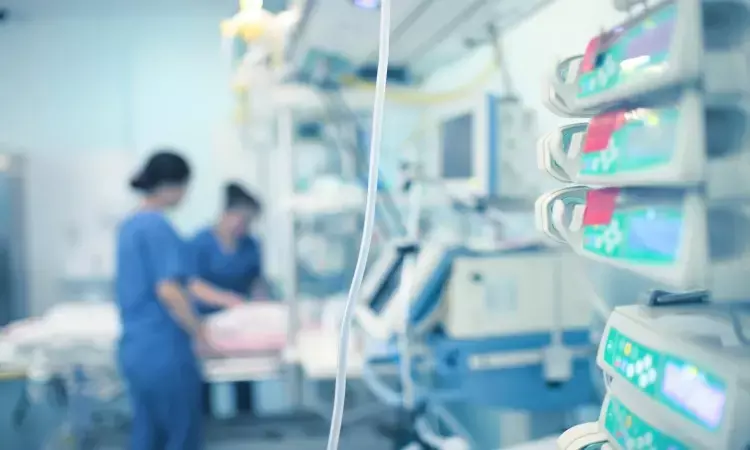- Home
- Medical news & Guidelines
- Anesthesiology
- Cardiology and CTVS
- Critical Care
- Dentistry
- Dermatology
- Diabetes and Endocrinology
- ENT
- Gastroenterology
- Medicine
- Nephrology
- Neurology
- Obstretics-Gynaecology
- Oncology
- Ophthalmology
- Orthopaedics
- Pediatrics-Neonatology
- Psychiatry
- Pulmonology
- Radiology
- Surgery
- Urology
- Laboratory Medicine
- Diet
- Nursing
- Paramedical
- Physiotherapy
- Health news
- Fact Check
- Bone Health Fact Check
- Brain Health Fact Check
- Cancer Related Fact Check
- Child Care Fact Check
- Dental and oral health fact check
- Diabetes and metabolic health fact check
- Diet and Nutrition Fact Check
- Eye and ENT Care Fact Check
- Fitness fact check
- Gut health fact check
- Heart health fact check
- Kidney health fact check
- Medical education fact check
- Men's health fact check
- Respiratory fact check
- Skin and hair care fact check
- Vaccine and Immunization fact check
- Women's health fact check
- AYUSH
- State News
- Andaman and Nicobar Islands
- Andhra Pradesh
- Arunachal Pradesh
- Assam
- Bihar
- Chandigarh
- Chattisgarh
- Dadra and Nagar Haveli
- Daman and Diu
- Delhi
- Goa
- Gujarat
- Haryana
- Himachal Pradesh
- Jammu & Kashmir
- Jharkhand
- Karnataka
- Kerala
- Ladakh
- Lakshadweep
- Madhya Pradesh
- Maharashtra
- Manipur
- Meghalaya
- Mizoram
- Nagaland
- Odisha
- Puducherry
- Punjab
- Rajasthan
- Sikkim
- Tamil Nadu
- Telangana
- Tripura
- Uttar Pradesh
- Uttrakhand
- West Bengal
- Medical Education
- Industry
Post-ICU syndrome common in COVID-19 survivors: Study

USA: Post-intensive care syndrome (PICS) is frequent in COVID-19 survivors, shows a new study done by Karissa Weidman and colleagues. There was no presence or connection with the use of benzodiazepines, steroids, or paralytics, or the length of ICU stay. The findings of this study were published in Annals of the American Thoracic Society on 30th April 2021.
The coronavirus disease 2019 (COVID-19) pandemic has resulted in a remarkable increase in the number of critical illness survivors. These survivors are more likely to have physical, psychological, and cognitive problems known as PICS. The incidence of PICS in COVID-19 survivors is unknown.
The study was undertaken by researchers to report the prevalence of physical, psychological, and cognitive impairment among COVID-19 intensive care unit (ICU) survivors receiving follow-up care in an ICU recovery clinic, to look for associations between PICS and ICU-related factors, and to compare the cohort of ICU survivors who attended the post-ICU clinic to the cohort of ICU survivors who did not.
For this study, the researchers conducted a retrospective cohort analysis of COVID-19 ICU survivors hospitalized from March to May 2020 and afterward seen at a New York City post-ICU recovery clinic. They extracted data from medical charts and used clinical screening devices for physical, psychological, and cognitive impairment. The relationships between these outcomes and care-related factors were investigated. The post-ICU clinic cohort's baseline characteristics and in-hospital therapies were compared to COVID-19 ICU survivors from the same institution who were not examined in the post-ICU clinic.
The key findings of this study were as follow:
1. In this post-ICU recovery clinic, 87 COVID-19 ICU survivors were seen.
2. The median age was 62 years, and 74% were men. The overall length of stay in the hospital was 51 days, while the median length of stay in the intensive care unit was 22 days.
3. At the post-ICU follow-up visit, 29%, 21%, and 13% of patients, respectively, exhibited clinically significant levels of depressive symptoms, anxiety, and post-traumatic stress disorder symptoms.
4. 25% of them tested positive for cognitive impairment.
5. PICS was found in 90% of people. There were no relationships between ICU stay length, delirium, or exposure to benzodiazepines, steroids, or systemic paralytics and positive screenings for physical, psychological, or cognitive damage.
6. The baseline characteristics and ICU-related parameters of COVID-19 ICU survivors who visited the ICU recovery clinic and those who did not were similar.
In conclusion, the findings of this retrospective cohort study of COVID-19 survivors after ICU stay indicate that the incidence of PICS is very high, with no clear association with specific ICU factors, and that paying attention to this significant clinical syndrome is critical to ensuring ongoing healthy outcomes.
Reference:
Post-ICU Syndrome in a Cohort of COVID-19 Survivors in New York City. Karissa Weidman , Elyse LaFond , Katherine L Hoffman , Parag Goyal , Christopher N Parkhurst , Heather Derry-Vick , Edward Schenck , and Lindsay Lief. https://doi.org/10.1513/AnnalsATS.202104-520OC
Medical Dialogues consists of a team of passionate medical/scientific writers, led by doctors and healthcare researchers. Our team efforts to bring you updated and timely news about the important happenings of the medical and healthcare sector. Our editorial team can be reached at editorial@medicaldialogues.in.
Dr Kamal Kant Kohli-MBBS, DTCD- a chest specialist with more than 30 years of practice and a flair for writing clinical articles, Dr Kamal Kant Kohli joined Medical Dialogues as a Chief Editor of Medical News. Besides writing articles, as an editor, he proofreads and verifies all the medical content published on Medical Dialogues including those coming from journals, studies,medical conferences,guidelines etc. Email: drkohli@medicaldialogues.in. Contact no. 011-43720751


